Running a kennel business can be one of the most rewarding ventures for people who love animals. You get to spend your days surrounded by dogs, help owners feel confident about leaving their pets, and build a business in a growing industry. But just like any other business, success doesn’t happen by chance. It takes planning, organization, and the right approach to stand out.
Whether you are thinking about starting your own kennel business, looking into kennel franchises, or growing an existing operation, every decision determines your success. Every detail matters, from how your facility is built to how you interact with customers.
This guide breaks down the top five things you need to know to run a successful kennel business, plus a few extra insights that can help set you apart.
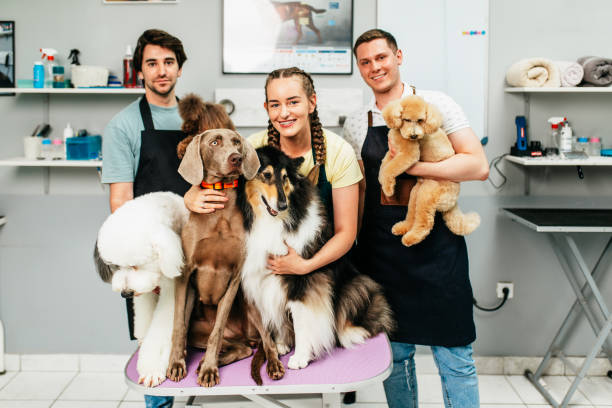
How to Start a Dog Kennel Business
You are not alone if you have been asking yourself, “How do I start a dog kennel business?” Many pet lovers dream of turning their passion into a career. The process begins with several necessary steps: selecting the correct location, planning your services, creating a clear business plan for your dog kennel, and understanding local rules and regulations.
Some build their own facility from scratch, while others explore Kennel franchises. Franchises can be helpful if you want an established brand and support system, but they also come with fees and requirements. If you prefer complete control and creativity, starting fresh with your brand may be the better path.
Regardless of the route you take, success ultimately depends on how well you prepare and how much effort you invest in building trust with pet owners.
Things to Know for a Kennel Business
The planning phase is over! Now it is time to build. The following steps will guide you through the essential actions to transform your business plan into a thriving, reputable dog kennel. Let’s get started.
1. Create a Comprehensive Business Plan

A strong business plan is the backbone of any successful dog kennel. This plan isn’t just a formality; it is a roadmap for the growth and operation of your business. Without a clear strategy, you could make costly mistakes or miss improvement opportunities.
Here is how to structure your business plan:
-
- Identify Your Target Market: Before launching your dog kennel business, it’s essential to understand your ideal customers. Are you targeting local dog owners seeking daycare or travelers requiring long-term boarding options? Defining your audience early on will shape your services, pricing, and marketing approach, key elements in building a solid business plan for a dog kennel.
-
- Establish Financial Goals: Your business plan should include a detailed financial projection. This covers everything from start-up costs (such as building, equipment, and permits) to ongoing expenses (including staff salaries, utilities, and maintenance). Be sure to plan for potential slow months and allocate a buffer for unexpected costs.
-
- Outline Your Services: Identify the services that will differentiate your dog kennel business. Will you provide grooming, training, or unique socialization experiences? For your pet, offering something extra adds value to your kennel business and helps attract loyal customers, a crucial component of any successful dog kennel business plan.
-
- Legal Considerations: Ensure your business plan includes a section on local laws and regulations for kennel operations. This includes zoning laws, necessary licenses, and any health and safety regulations that must be complied with.
A solid Dog Kennel Business Plan is not just something you create and forget. It should grow with your kennel business, helping you stay on track, make smart adjustments, and keep your long-term vision in focus.
2. Ensure the Comfort and Safety of the Pets in Your Care
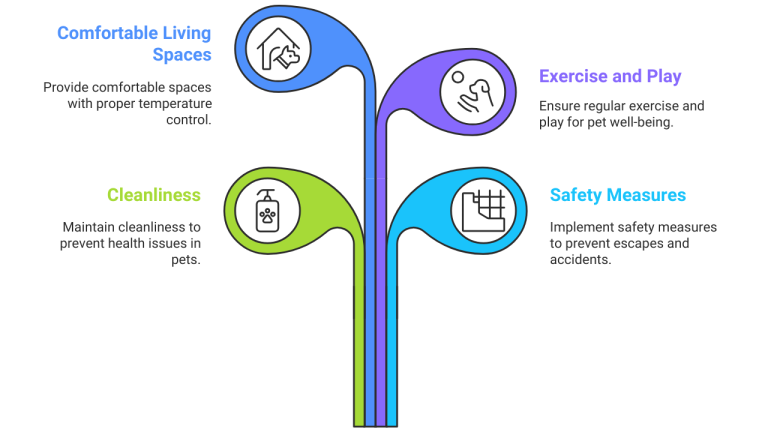
In the dog kennel business, nothing matters more than the comfort and safety of the dogs in your care. Pet owners must feel confident that their furry companions are in good hands. Creating a secure, welcoming environment isn’t just good practice; it is essential to building trust and long-term loyalty in your kennel business.
Here’s what you need to focus on:
- Cleanliness: Regular cleaning and sanitation are crucial to maintaining a safe environment. A well-kept kennel reduces the risk of health problems like infections and parasites. Ensure all kennels, play areas, and shared spaces are cleaned and disinfected daily.
- Safety Measures: Your kennel should have secure fencing, sturdy gates, and locked areas to prevent dogs from escaping or interacting with other pets in ways that could cause harm. Additionally, ensure the kennel is equipped with non-slip floors to avoid accidents.
- Comfortable Living Spaces: Dogs need room to relax, play, and move around. Avoiding overcrowding is key to keeping pets comfortable and stress-free in your dog kennel business. Ensure your space has proper temperature control; too extreme heat or cold can quickly become problematic. These details are significant in running a successful kennel business and should be part of your business plan for a dog kennel.
- Exercise and Play: Exercise isn’t just a bonus but a must for any dog’s health and happiness. If you are serious about your dog kennel business, ensure every pup has plenty of time to move, play, and socialize. Not only does this ease stress, but it also shows pet owners you genuinely care. Building that kind of trust is enormous for your kennel business and should be part of your dog kennel business plan.
When pets feel safe, secure, and happy, you will gain the trust of pet owners, and your kennel will build a reputation for being a caring and reliable place for their pets.
3. Streamline Operations with Kennel Management Software
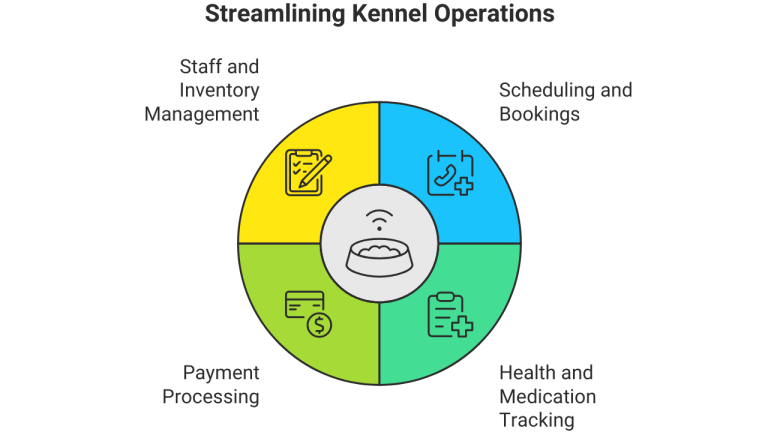
There is a lot to juggle when running a dog kennel business, including scheduling, client communication, keeping up with each dog’s health records, and more. Things can get overwhelming fast. That is why using Kennel Management Software isn’t just helpful, it’s a game-changer. It keeps your operation organized and running smoothly, so you can spend less time buried in paperwork and more time focusing on the dogs and growing your kennel business. If you are working on a business plan for a dog kennel, this is one tool worth including.
- Scheduling and Bookings: Relying on manual logs or spreadsheets can quickly become a headache when running a kennel business. Kennel management software simplifies everything by automating the booking process. Clients can easily book their pet’s stays online, and the software keeps track of availability, so you don’t have to worry about double-booking or missed appointments.
- Health and Medication Tracking: With the right software, you can maintain detailed health records for each dog. These records include vaccination dates, medical conditions, allergies, and medication schedules, ensuring that pets get the proper care while staying with you.
- Payment Processing: The software can handle invoicing, payments, and receipts, simplifying the financial side of your business. You can also offer clients various payment options, such as online or in-person transactions, enhancing customer convenience.
- Staff and Inventory Management: Kennel management software can help you manage team member schedules, track inventory, and stay on top of daily tasks, ultimately keeping your operations running smoothly.
Kennel management software can automate time-consuming tasks, reduce errors, and improve the overall efficiency of your kennel business.
4. Provide Excellent Customer Service and Marketing
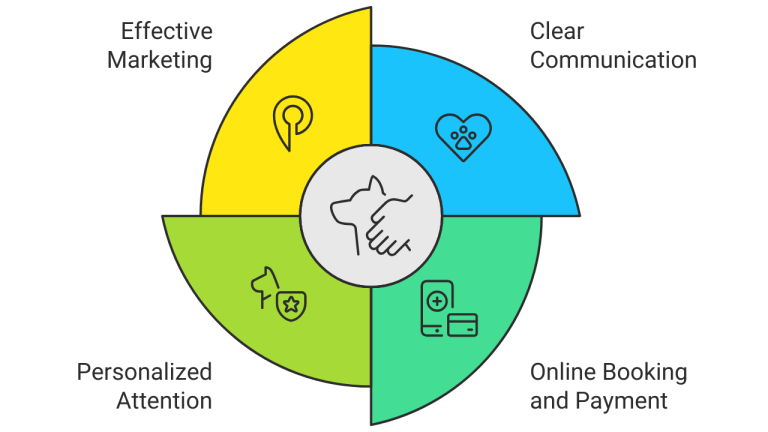
Your kennel’s success hinges on how well you deliver customer service. When customers are satisfied, they are more likely to return, recommend your services to others, and leave positive reviews that help attract new clients. Here are a few tips to ensure you are providing excellent service:
- Clear Communication: Keep your clients informed about their pet’s well-being while they are with you. Offering updates through photos or videos is a great way to reassure pet owners and show them that their dogs are in good hands.
- Online Booking and Payment: Offer an online booking system to simplify the process for customers. This system allows clients to book and pay for services in advance, making the entire experience more convenient.
- Personalized Attention: Dogs are different; some may need extra attention or special accommodations. You will spend a lot of time understanding each dog’s unique needs and preferences, which will improve their experience and demonstrate your commitment to their care.
- Effective Marketing: Utilize social media platforms, your website, and email newsletters to maintain a strong connection with your customers. Share behind-the-scenes photos, pet care tips, and promotions. Building an online presence will help you stand out and attract new clients. You must provide excellent service, and effective marketing strategies for your kennel business will ensure success and growth.
5. Hire & Train a Skilled Team
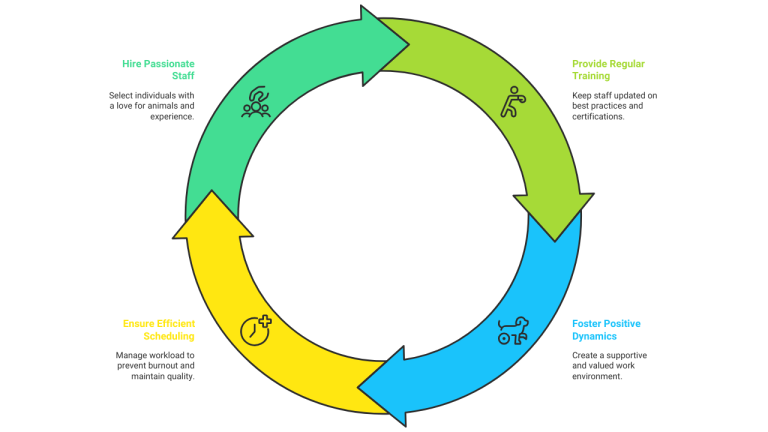
The success of your dog kennel business largely depends on your staff. A team of passionate, well-trained, and professional Kennel Manager makes all the difference in ensuring the dogs receive the best care and that your customers are satisfied with your services.
Here’s what to consider when hiring and training your team:
- Hiring the Right People: Look for individuals passionate about animals with dog care experience. Staff should be patient, attentive, and capable of handling dogs of various temperaments.
- Training and Development: Regular training is essential for keeping your staff up-to-date on best practices in pet care, customer service, and emergency procedures. Encourage staff to attend workshops or earn certifications in animal care.
- Team Dynamics: Develop a positive work environment where your team feels supported and valued. A happy, motivated staff will provide better dog care and create a better client experience.
- Efficiency and Scheduling: To avoid burnout, ensure your team is well-scheduled. Staff members should have clear duties and responsibilities, which will help streamline operations and provide high-quality care.
A skilled and dedicated team will be instrumental in making your kennel business a success, helping you build a reputation for quality care and exceptional customer service.
Table of Key Steps for a Successful Kennel Business
This table summarizes the five essential steps for launching and managing a thriving kennel operation, drawing from the blog’s insights on planning, safety, and efficiency. It highlights focus areas like business planning, pet comfort, practical inclusions, and their importance for long-term success. By following these guidelines, kennel owners can build trust, streamline processes, and drive profitability in the growing pet care industry.
|
Step |
Focus Area |
What to Include |
Why It Matters |
|
1. Create a Comprehensive Business Plan |
Target Market, Financial Goals, Services, Legal Considerations |
Identify customers (daycare vs. boarding), plan expenses and revenue, outline services like grooming/training, and comply with laws and permits |
Provides a roadmap, avoids costly mistakes, and keeps your kennel business on track |
|
2. Ensure the Comfort & Safety of Pets |
Cleanliness, Safety Measures, Comfortable Spaces, Exercise & Play |
Daily cleaning/disinfection, secure fencing, temperature control, proper space, supervised playtime |
Builds trust with pet owners and keeps dogs happy, healthy, and stress-free |
|
3. Streamline Operations with Kennel Management Software |
Scheduling, Health Tracking, Payments, Staff & Inventory |
Automate bookings, track vaccinations and medication, simplify billing, manage staff schedules and supplies |
Saves time, reduces errors, improves customer experience, and boosts efficiency |
|
4. Provide Excellent Customer Service & Marketing |
Communication, Online Booking, Personalized Care, Digital Marketing |
Send photo/video updates, allow online booking/payment, tailor care to each dog, use social media and newsletters |
Keeps customers loyal, encourages repeat business, and helps attract new clients |
|
5. Hire & Train a Skilled Team |
Recruitment, Training, Team Dynamics, Scheduling |
Hire passionate animal lovers, provide ongoing training, create a supportive culture, and assign clear duties. |
Ensures high-quality care, avoids staff burnout, and improves client satisfaction |
Building a Dog Boarding Facility
A successful kennel starts with the right space. Building a dog boarding facility takes careful planning. You will need well-ventilated rooms, durable flooring, proper drainage, and safe outdoor play areas. Each kennel should feel comfortable, not cramped.
Pet owners often judge a kennel by its appearance. A clean, well-designed facility improves pet safety and builds trust in your brand.
Conclusion
Creating a successful dog kennel business requires more than just a love of animals. It takes a clear kennel business plan, safe and comfortable facilities, the right technology, great customer service, and a team that shares your passion.
The pet care industry continues to grow, offering opportunities for those ready to commit. Whether starting a dog kennel, joining kennel franchises, or building a dog boarding facility from the ground up, your success depends on preparation, consistency, and care.
FAQs (Frequently Asked Questions)
-
How much money can a dog kennel make?
Earnings vary, but many kennels, depending on size and services, earn between a few thousand dollars per month and six figures annually.
-
Which pet business is most profitable?
Dog kennels, grooming services, and daycare centers are some of the most profitable pet businesses.
-
Is a dog kennel a good investment?
With the pet care industry growing, kennels can be a substantial long-term investment when managed well.
-
How much do kennels charge a day?
Most kennels charge between $25 and $75 daily, depending on location, services, and amenities.
-
How much money does a kennel owner make?
Kennel owners can earn between $30,000 and over $100,000 per year, depending on the size of the facility and the range of services offered.



